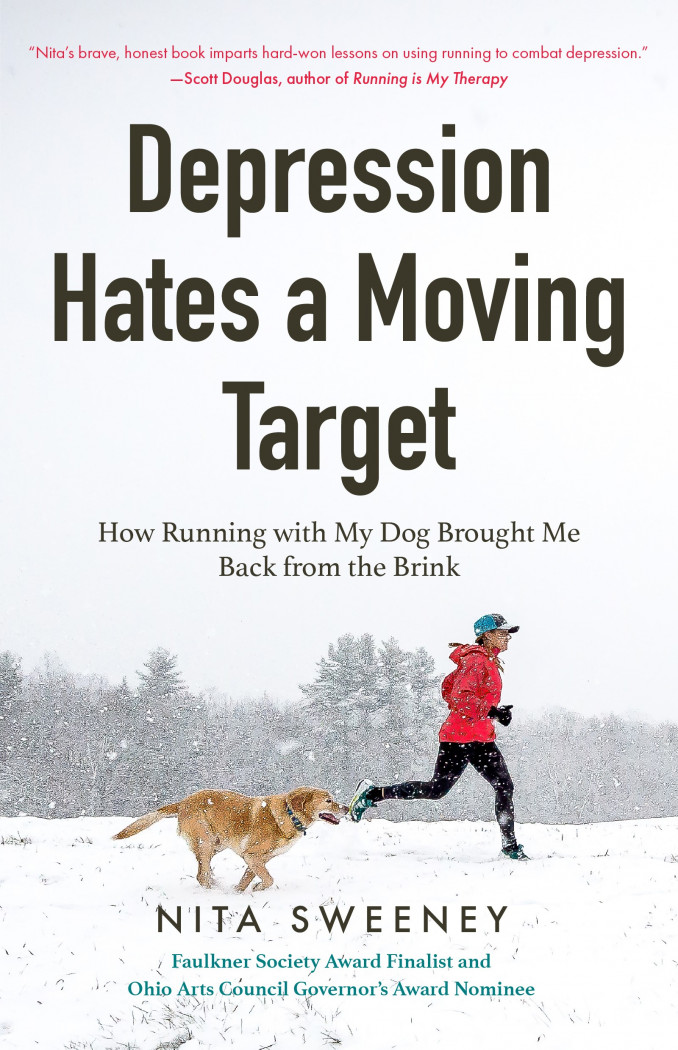This review is going to be a bit different because of my survivor viewpoint. I figure most of my readers are also psychiatric survivors which is why I am going this route.
The purpose of writing is to bring the reader from Point A to Point B. This means wherever you’re at, if you read the work, you will be transformed in some fashion. For me, reading the book Depression Hates a Moving Target was a transforming experience.
Memoir presents the added challenge, for the writer, to illustrate how the book’s protagonist, the self, also moved from Point A to Point B, and it should be written in a way that others can relate.
I admit I have some biases, and biases are part of who we are as human beings. Bias cannot be avoided. That said, I am proud to say I know Nita. We went to graduate school together. She was in a class ahead of me. We didn’t talk that much, but I do recall admiring her. I was amazed that she had studied with Natalie Goldberg, and also, ran her own writing club in Ohio. I figured I sure couldn’t do that! I recall one particular conversation we had near the end of my grad school experience when we rode the bus together to Port Townsend, Washington.
To me, it really means a lot when a person shares that they had a mental health experience. Nita said she was a recovering alcoholic and also a survivor of an eating disorder. She told me she “used to be really depressed.”
Even back then, I noticed something about her. She was wildly underconfident considering her amazing accomplishments. I noticed the way her voice trailed off at the ends of sentences. She also habitually added qualifiers, such as “I don’t know,” or “I suppose.” It was almost like she was sabotaging herself. But why?
It turned out that what she had told me wasn’t quite true. The “used to be depressed” part. She was still depressed.
It was after graduate school that Nita took up running. Her book is about the most honestly written Couch to 5k story I have ever read. Except there’s one hitch: She started running when she was over 50. And she didn’t just run 5k. You’ll have to read the book to find out.
I recommend this book to the survivor community, but not for the usual reasons. This isn’t a book that bashes psychiatry and the DSM. This isn’t a book about getting off meds. It is, though, a book about the value of exercise.
I suspect that many of you out there don’t exercise enough, although I know some of you do. I’m not trying to shove running in your faces, either, although, as you may know, I’m biased toward it.
Can running cure depression? I’d say it can. I have known people who refused drugs and therapy and took up running instead, with much success. Running is a great form of meditation, also. In my opinion, it’s the best form, because while you are running you are doing something useful instead of just sitting and saying some nonsense word such as “Om.” For those of us with health conditions (like me), running literally keeps us alive.
This book, Depression Hates a Moving Target, illustrates how Nita went from over-the-top underconfident and prone to catastrophizing to strong and self-assured. She credits this to running, and shows you just how this happened.
Some of the catastrophizing is truly amusing, too. She worried that she’d get into a car accident or catch a horrible disease right before the race. These musings were so funny to me that I laughed out loud (and at the time I happened to be in public).
Another thing I observed were the self-deprecating remarks. I had observed this in Nita when she was in graduate school as well. This commentary gets very funny at times, for instance, when she tells herself she should give up running because she’s “too fat.”
However, what I noticed, and you may, too, is that this catastrophizing and self-deprecation slowly and gradually diminished as the book progressed. Isn’t that cool?
I love reading about a non-meds way that a person beats depression. Anything beside the usual psychiatric recommendation “meds and therapy” makes me very happy. Through running, Nita was able to reduce the number of “meds” she took from six to three, and all these doses were significantly lowered. Clearly, Nita has had exposure to those of us who aren’t fond of pharma, as when she states that she still needs “meds,” she says this almost apologetically.
I want to ask the survivor community to set aside your opinion about diagnoses. Nita does use disease-words a lot, and we do not. However, we must realize that most of society does think that depression is a disease. We know better, but the logic behind our knowledge is not well known. We cannot expect everyone to stop using disease names when the media and psychiatry continue to push the DSM ad nauseum.
This book taught me to open my eyes to the fact that most people still use this vocabulary. Most who were diagnosed “bipolar” will also call normal highs and lows “symptoms” even though highs and lows are normal to the human condition and the rest of us won’t use these words. I see examples throughout the book, notably feeling high while running or after a major accomplishment. Likewise, a few days after the accomplishment high has worn off, people tend to crash. Many out there don’t realize this isn’t a symptom.
In my opinion, we, as a survivor community, need to be more open to this popular, though erroneous, point of view. People are trained to believe these things, and if we are going to be successful as a movement, we must be inclusive (or a little bit so) of the mainstream folks who very well may join us in the future.
Depression Hates a Moving Target is a moving story that I think anyone (especially us runners!) can relate to. The book was a reminder to me that people are at different points in their lives.
Nita adds that her mental health services have been excellent, but also recognizes that for many of us, it’s crap. It’s at least crap. It’s a human rights violation. I remember, though, when I had what I believed was decent mental health care. This kept me coming back for years, sadly. I suspect what happens eventually to many of us is that the “services” go from great to mediocre to downright horrifying. That is when we get turned off. Some people just aren’t at that point yet.
Are we all coming out? Are we all moving toward liberation from the mental health world, at whatever stage we’re at?
You can read in this book how Nita came to the realization that the usual “therapy and meds” isn’t the only answer. Running was so curative for her that her whole life was transformed. That, to me, is huge. We need to respect that and not expect people to become totally liberated from psychiatry and the DSM overnight, and we must be careful about not pressuring people too much (coercion is a no-no, right?). The value of running, illustrated beautifully in this book, is something we need to start paying attention to as well.
Nita especially loves running with her dogs. I love the way she portrays her two dogs, Mr. Dawg and Morgan. I think you will, too. Again, the power of pets is something we don’t talk about enough in our movement. I know from experience that running with a dog adds something very special to my run. I think you will find the same thing.
Black Box Warning: If you read this book you might be inspired to take up running.
Here is the link to the book: https://www.amazon.com/Depression-Hates-Moving-Target-Running/dp/1642500135/ The cost for both Kindle and paperback is just over $12. The publisher is Mango Publishing.
Originally posted here.


